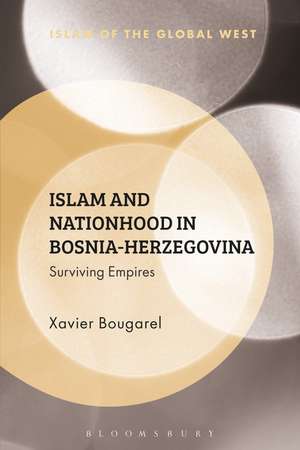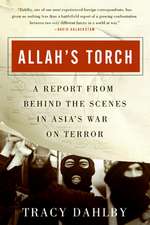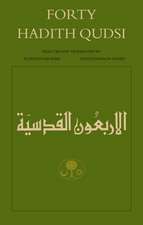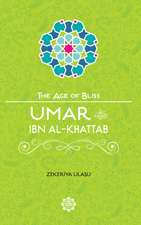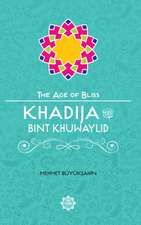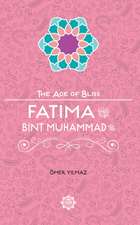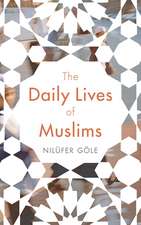Islam and Nationhood in Bosnia-Herzegovina: Surviving Empires: Islam of the Global West
Autor Xavier Bougarelen Limba Engleză Paperback – 26 iun 2019
| Toate formatele și edițiile | Preț | Express |
|---|---|---|
| Paperback (1) | 231.69 lei 6-8 săpt. | |
| Bloomsbury Publishing – 26 iun 2019 | 231.69 lei 6-8 săpt. | |
| Hardback (1) | 717.79 lei 6-8 săpt. | |
| Bloomsbury Publishing – 13 dec 2017 | 717.79 lei 6-8 săpt. |
Preț: 231.69 lei
Preț vechi: 297.56 lei
-22% Nou
Puncte Express: 348
Preț estimativ în valută:
44.35€ • 48.19$ • 37.28£
44.35€ • 48.19$ • 37.28£
Carte tipărită la comandă
Livrare economică 22 aprilie-06 mai
Preluare comenzi: 021 569.72.76
Specificații
ISBN-13: 9781350117082
ISBN-10: 1350117080
Pagini: 280
Dimensiuni: 156 x 234 x 18 mm
Greutate: 0.39 kg
Editura: Bloomsbury Publishing
Colecția Bloomsbury Academic
Seria Islam of the Global West
Locul publicării:London, United Kingdom
ISBN-10: 1350117080
Pagini: 280
Dimensiuni: 156 x 234 x 18 mm
Greutate: 0.39 kg
Editura: Bloomsbury Publishing
Colecția Bloomsbury Academic
Seria Islam of the Global West
Locul publicării:London, United Kingdom
Caracteristici
The first book to analyse the ties between Islam and national identity in Bosnia and Herzegovina since the late 19th century, and the first to reinterpret this within the context of the larger Muslim world
Notă biografică
Xavier Bougarel is a researcher at CETOBAC, Centre d'études turques, ottomanes, balkaniques et centrasiatiques, in Paris, France. He specializes in the former Yugoslavia and Balkan Islam. He is also co-editor of Europe's Balkan Muslims: A New History (2017), Investigating Srebrenica: Institutions, Facts, Responsibilities (2012) and The New Bosnian Mosaic: Identities, Memories and Moral Claims in a Post-War Society (2007).
Cuprins
AcronymsNote on terminologyList of mapsIntroduction1. The origins of national indetermination (1878-1914)2. The disillusions of Yugoslavism (1914-1941)3. A winding search for security (1941-1945)4. Emergence of the Muslim nation (1945-90)5. Caught in the mortal embrace of nationalism (1990-95) 6. A Bosniak nation centred on Islam (1990-95)7. Dreams of a nation, search for an empire (1995-2013) Conclusion Bibliographyindex
Recenzii
It is highly recommended to all interested in national identity-building and the history of Islam in the Balkans.
In this excellent book, Bougarel frequently returns to the paradoxes, continuities and divergences between Islam, nation¬hood and statehood in Bosnia-Herzegovina.
Bougarel's book on Islam and nationhood should become required reading for any scholar dealing with Bosnia-Herzegovina, and for readers eager to know more about complicated nation-building processes in the Balkans.
[T]he most authoritative and comprehensive work to date on the political history of the Bosniaks/Muslims of Bosnia and Herzegovina.
Bougarel's book is the finest analysis of roots and evolution of Islamic ideology in Europe, as well as a thoughtful account of the historical and political trajectory of Bosnia in recent years. Its ultimate input is in elucidating why and how Bosniak Muslims in Europe turned their back on pan-Islam, endorsing instead a special brand of Islamic nationalism, which failed other Muslim nation states in the Middle East.
This insightful study demonstrates the centrality of Islam and Islamic institutions in the evolution of Bosniak national identity. Drawing upon significant new research, Islam and Nationhood in Bosnia-Herzegovina greatly advances our understanding of Muslim responses to war and nation-building in the 1990s.
This is a comprehensive and accessible presentation of a complex situation. The author combines an expert account of the deep history of Bosnia and Herzegovina with a knowledgeable analysis of where the country is today. This is an essential addition to the literature for both students and the general reader.
In Islam and Nationhood in Bosnia-Herzegovina: Surviving Empires, Xavier Bougarel once again demonstrates why he should be considered one of the outstanding scholars of former-Yugoslavia. The book is meticulously researched and originally argued, and methodology (combining long-term factors and deep understanding of the historical context with relevant theoretical discussions) is apt. Dr Bougarel's scholarship and his obvious urge to question, probe and challenge established norms and conventional wisdoms about the region set him apart from most of his peers. A decades-long political and identity crisis in Bosnia-Herzegovina makes the book particularly timely. It should be read not only by students of the modern Balkans, but by anyone interested in such pertinent questions of our era as religion, nationalism, and empire.
In this excellent book, Bougarel frequently returns to the paradoxes, continuities and divergences between Islam, nation¬hood and statehood in Bosnia-Herzegovina.
Bougarel's book on Islam and nationhood should become required reading for any scholar dealing with Bosnia-Herzegovina, and for readers eager to know more about complicated nation-building processes in the Balkans.
[T]he most authoritative and comprehensive work to date on the political history of the Bosniaks/Muslims of Bosnia and Herzegovina.
Bougarel's book is the finest analysis of roots and evolution of Islamic ideology in Europe, as well as a thoughtful account of the historical and political trajectory of Bosnia in recent years. Its ultimate input is in elucidating why and how Bosniak Muslims in Europe turned their back on pan-Islam, endorsing instead a special brand of Islamic nationalism, which failed other Muslim nation states in the Middle East.
This insightful study demonstrates the centrality of Islam and Islamic institutions in the evolution of Bosniak national identity. Drawing upon significant new research, Islam and Nationhood in Bosnia-Herzegovina greatly advances our understanding of Muslim responses to war and nation-building in the 1990s.
This is a comprehensive and accessible presentation of a complex situation. The author combines an expert account of the deep history of Bosnia and Herzegovina with a knowledgeable analysis of where the country is today. This is an essential addition to the literature for both students and the general reader.
In Islam and Nationhood in Bosnia-Herzegovina: Surviving Empires, Xavier Bougarel once again demonstrates why he should be considered one of the outstanding scholars of former-Yugoslavia. The book is meticulously researched and originally argued, and methodology (combining long-term factors and deep understanding of the historical context with relevant theoretical discussions) is apt. Dr Bougarel's scholarship and his obvious urge to question, probe and challenge established norms and conventional wisdoms about the region set him apart from most of his peers. A decades-long political and identity crisis in Bosnia-Herzegovina makes the book particularly timely. It should be read not only by students of the modern Balkans, but by anyone interested in such pertinent questions of our era as religion, nationalism, and empire.
